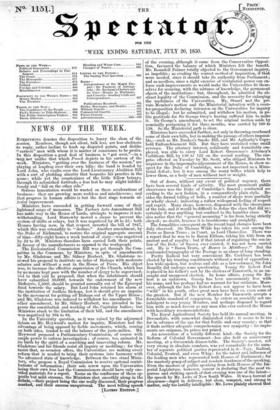NEWS OF THE WEEK.
Traarrlinirs denotes the disposition to hurry the close of the .session. Members, though not silent, talk less, are less obstinate -to reply, rather incline to hush up disputed points, and dislike ." earnest" men with whom it is matter of conscience to be prolix. In this disposition a good deal of business is "got over,"—in a twa:y, not uke that which Punch depicts in his cartoon of the -week. Ministers, "getting over the business of the session," are playing at leapfrog over their own bills : the band is headed by Lord Sohn, who vaults over the Lord-Lieutenancy Abolition Bill with a sort of plodding alacrity that bespeaks his practice in the game ; while yet the countenance of the little fellow betrays, 'through its astonished fortitude, a fear lest he may alight infehm- _toualy and "fall on the other side."
Serious lamentation would be wasted on these accelerations of business : they are growing more reckless and mischievous ; and that progress in human affairs is but the first stage towards ul- terior improvement.
Ministers have succeeded in getting forward some of their .lightened cargo of measures. The Factory Acts Amendment Bill has made way in the House of Lords, attempts to improve it not- -withstanding. Lord Harrowby moved a clause to prevent the _system of shifts or relays, but it was negatived by 58 to 25; both -Houses having now, in that respect, inverted the bill of 1847, which this was ostensibly to "declare." Another amendment, by the Duke of Richmond, to restore the original aggregate amount of time—fifty-eight hours a week instead of sixty—was negatived :by 62 to 39. Ministers therefore have carried both their points, in favour of the manufacturers as opposed to the workpeople.
The Ecclesiastical Commission Bill was got through the Com- mittee in the Commons, by Ministers, in spite of amendments by Mr. Gladstone and Mr. Sidney Herbert. Mr. Gladstone re- newed his proposal to institute an order of Bishops with moderate salaries and without a seat in the House of Peers. His object was, to increase the effective supervision of the Church, which has by no means kept pace with the number of clergy to be supervised; and to that 'end he proposed, that when the inhabitants should have subscribed 30,000/. towards the endowment of the new Bishopric, 1,500/. should be granted annually out of the Episcopal fund towards the salary. But Lord John retained his alarm at the institution of lordless Bishops, lest it should give an impulse to the movement for getting all Bishops out of the U • • -r House ; land Mr.. Gladstone was induced to withdraw his amen' ent The other amendment, by Mr. Sidney Herbert, was intended to im- prove the constitution and working of the Capitular bodies • but M iinisters stack to the limitation of the bill, and the amendment -was negatived by 104 to 84. In the University question, as it was raised by the adjourned debate on Mr. Heywood's motion for inquiry, Ministers had the advantage of being opposed by feeble movements, which, coming on both sides, tended to aid the balance of the juste-milieu. Mr. Heywood proposed a Parliamentary Commission, of course with umple power to enforce investigation ; of course, too, animated in its birth by the spirit of a searching and innovating reform. Mr. 'Gladstone and his friends resist all inquiry or meddling ; for they insist that, as occasion offers, the Universities are making every reform that is needed to bring their systems into harmony with tlaa advanced state of knowledge. Between the two stand Minis- ters, who propose a Royal Commission to receive optional contri- butions of information ; Aeir sole screw upon the Universities being their own fear lest the Commissioners should have only one- sided materials for a report. Borne on the confluence of these op- posite but mild streams, the Ministers shot smoothly along in the debate, —their project being the one really discussed, their progress marked, and their success unequivocal. The most telling speech of the evening, although it came from the Conservative Opposi- tion, favoured the balance of which Ministers felt the benefit. Mr. Itoundell Palmer totally objected to the Government inquiry, as impolitic as evading the correct method of inquisition, if that were needed; since it should take its authority from Parliament ; and as needless, since a right exercise of visitatorial power can en- force such improvements as would make the Uniyersities fit them- selves for securing, with the adVance of knowledge, the permanent Weds of the institutions : but, throughout, he admitted the ab- stract legality of the Commission, and the necessity for enlarging the usefulness of the Universities. Mr. Stuart met the pri- vate Member's motion and the Ministerial' intention with a coun- ter-proposition declaring intrusion on the Universities for inquiry to be illegal ; but he submitted, and withdrew his motion, in po- lite gratitude for Sir George Grey's having suffered him to make it. Sir George's amendment, to set the original motion aside by nominally postponing it for three months, was carried by 160 to 138. So the Ministerial path is clear. Ministers have succeeded further, not only in throwing overboard some of their own bills, but in making the passage of others impossi- ble,—such as Mr. Bankes's Smoke Bill, and Mr. Aglionby's Copy- hold Enfranchisement Bill. But they have sustained some small reverses. The attorney interest, sedulously and formidably em- ployed, was able to carry Lord Robert Grosvenor's Attorney's Certificate Bill, by 139 to 122 on the second reading. The sur- prise effected on 'Tuesday by Mr. Scott, who obliged Ministers to acquiesce in the impromptu adjournment of the House, to show re- spect for the Duke of Cambridge, was not important as a Minis- terial defeat ; but it was among the many trifles which help to lower them, as a body of men without tact or weight.


























